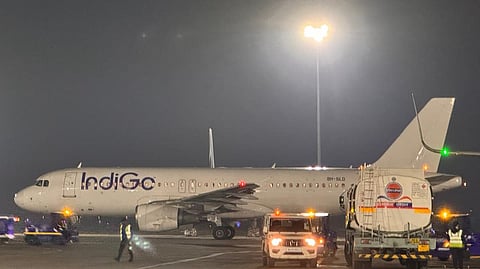

New Delhi: The government has started work on a draft sustainable aviation fuel (SAF) policy, which is currently at a very preliminary stage, a senior civil aviation official said on Monday. Speaking at the India SAF Conclave 2025, Ekta Agrawal, Director at the Directorate General of Civil Aviation (DGCA), said, “The government is working on a draft SAF policy. I would say that it is at stage zero. And we would like your (industry's) feedback. We would also reach out to our line ministries to seek their views on the draft.”
Follow Energy Watch on X
Speaking at the same conclave, Dr Sangita M Kasture, Scientist G at the Ministry of New and Renewable Energy (MNRE), stressed that biomass will be central to India’s efforts to decarbonise aviation.
“We need to understand how much biomass is available and how much of it is being utilised. The government is already conducting a study to ascertain these things and find out how much can be made available for production of SAF,” she said during the inaugural session.
The assessment is expected to provide a clearer picture of the feedstock base that India can mobilise to support SAF production at scale, particularly from agricultural residues and waste streams.
India has already taken initial steps to integrate SAF into aviation. In 2018, SpiceJet operated the country’s first biofuel-powered test flight. More recently, in 2023, AirAsia India and Indian Oil collaborated on India’s first commercial flight using an indigenous SAF blend on the Delhi–Pune route.
At the international level, India has reaffirmed its commitment to align with the Carbon Offsetting and Reduction Scheme for International Aviation (CORSIA) and the Long-Term Aspirational Goal (LTAG) of achieving net-zero emissions in aviation by 2050. Civil Aviation Minister Kinjarapu Rammohan Naidu recently underscored India’s readiness to support these targets, emphasising that domestic initiatives on SAF will form a key part of the strategy.
Alongside policy discussions, India’s fuel and bioenergy industry has begun investing in capacity and technology to prepare for large-scale SAF adoption. Indian Oil Corporation’s Panipat refinery has secured ISCC-CORSIA certification and is targeting 35,000 tonnes of SAF production by 2025. Praj Industries, in collaboration with LanzaJet, has commissioned a 1 kilolitre per day Alcohol-to-Jet demonstration plant in Pune, and has already powered a commercial flight with its output. Meanwhile, TruAlt Bioenergy is planning a 15–20 kilolitre per day commercial facility in Karnataka.
These early projects are seen as the first steps toward building a domestic SAF ecosystem that can both meet India’s blending requirements and, in the long run, cater to export markets where binding SAF mandates are tightening.
Follow Energy Watch on LinkedIN
The comments from DGCA and MNRE underscore a two-pronged approach: while the draft policy will provide a regulatory framework, the biomass study will help determine the country’s production potential. Both officials stressed the need for industry inputs as the government formulates its strategy to integrate SAF into India’s aviation fuel mix.
